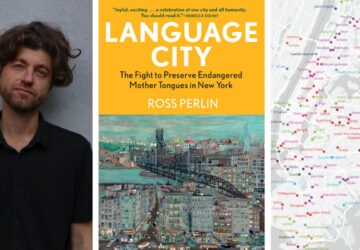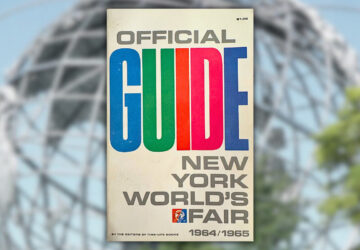As part of last weekend’s New Yorker Festival, co-sponsored by Mastercard, renowned lesbian cartoonist Alison Bechdel gave a talk Saturday, which was moderated by New Yorker writer Judith Thurman at the School of Visual Arts Theatre on 23rd Street, between 8th and 9th avenues. Though Thurman had already published a profile of Bechdel in The New Yorker in April, she seemed excited to have the chance to interview Bechdel, whom she called “one of the premier graphic memoirists in the country,” in front of a live audience.
At Thurman’s direction, Bechdel talked extensively about her two graphic memoirs, the acclaimed Fun Home, which centers around Bechdel’s relationship with her deceased father, and her newest release, Are You My Mother?, which, unsurprisingly, deals with the author’s interaction with her mom.
“It took me a really long time to realize that’s what I was going to be writing about,” said Bechdel of the mother/daughter relationship present in Are You My Mother? During the talk, she described her mother as an elusive, distant presence in a household that was already dysfunctional enough.
“The secret of our household was that my father was gay, or bisexual, I guess, and he was having affairs with other men, and his students, in fact,” said Bechdel, before sharing her own experience of coming out in this household. Apparently, her parents had very different reactions to her lesbianism.
“My mother wasn’t talking to me, and my dad was very intimate. He was like, ‘Oh cool, well, I’m glad you’re having fun,'” said Bechdel, with a laugh. “Like I was in some big orgy or something.” Then, her tone a bit more sober, “I suddenly became this kind of footnote in my parents’ failed marriage,” Bechdel added.
She also discussed Fun Home in depth, and it seemed as though the two projects were inextricable in Bechdel’s mind; she pointed out that she had repeated several of the scenes from Fun Home in Are You My Mother?.
“I see both of these books as political histories in a way, and [they show] the differences between my life as a lesbian and my mom and dad’s lives.” Still, throughout the talk, Bechdel kept her tone light, and though she did address the very serious complexities of her family life, she seemed to strive for a kind of comedic balance.
When asked about just how “true” her narrative in Are You My Mother? really was, Bechdel thought for a moment before replying. “It was as honest as it could be with my mother looking over my shoulder,” she said, finally. But then, she added, almost immediately, “I mean, my mother was great. I’m fine. Why am I writing books like this?” she laughed.
Later, she elaborated on this notion of truth in creative nonfiction: “It’s a slippery slope. I could say, ‘Well, it felt like the truth of what was happening,’ but then you can say that about anything. I guess you just have to trust me.”
Soon Thurman moved on to questions that concerned Bechdel’s actual creative process. Technically, Bechdel explained that she starts her drafts in Illustrator, so that she can decide on the spatial architecture of her story as she is writing the content. Then she places the draft into InDesign, where she can more easily work with the many layers of her project (the text and inked-in sketches form one layer, while her watercolor shading and spot coloring form another).
“One thing that really excites me about cartooning is that it’s writing two-dimensionally and not one-dimensionally. It really matters where the words fall on the page,” said Bechdel. “I am writing, but I’m also kind of drawing, too–I think of [each draft] as a drawing.”
Bechdel also has a very specific process as far as the drawings themselves are concerned. “I pose for pretty much all the characters in the book,” she said, while showing photos she had taken of herself posing for specific scenes. “I spend a lot of time posing as myself, even.”
After she takes pictures of these poses, Bechdel uses them as models from which to draw her visual content for the books. “I was showing these [photos] to a friend, and they were like, ‘That looks fun! It looks like you’re playing.’ And I was like, ‘What? Can’t you tell this is excruciating for me?'” she said jokingly of a particularly difficult pose.
Of generating content, of the actual creative writing process itself, Bechdel said, “I’m like an emotional high-wire act. I [am] like, ‘I guess I should just start walking out here and see what happens.'”
Thurman ended the discussion by asking about the respective final scenes of Fun Home and Are You My Mother? They are exceptionally similar in sentiment, and serve to harmonize the two very inter-connected books. Each tries to vindicate the somewhat rocky relationship between Bechdel and her parent by ending on a specific, nostalgic moment of Bechdel’s childhood that symbolizes the lasting impression each of her parents left on her life.
Of the ending in Fun Home, which juxtaposes her father’s suicide (he jumped in front of a truck) with a scene showing Bechdel leaping from a diving board into his outstretched arms, Bechdel says:
“[My father] had taught me to be the artist who was writing this down. [The end scene] is this mythic scene, it’s an acknowledgement of that [lesson].”
And regarding the final scene in Are You My Mother?, an arial view of Bechdel as a child, playing an acting game with her mother, Bechdel explains:
“Wierdly, or not so weirdly, it’s the same thing [as in Fun Home]. It was this feeling of ‘Oh my God, you can imagine anything you want.’ She gave me the idea that I could write my way out.”
If you would like to see this talk for yourself, it is available for purchase from FORA.tv here. Alison Bechdel will also be talking with Katie Roiphe at Strand Bookstore on Monday, October 15, from 7-8 p.m.
Get in touch with the author @kellitrapnell.





